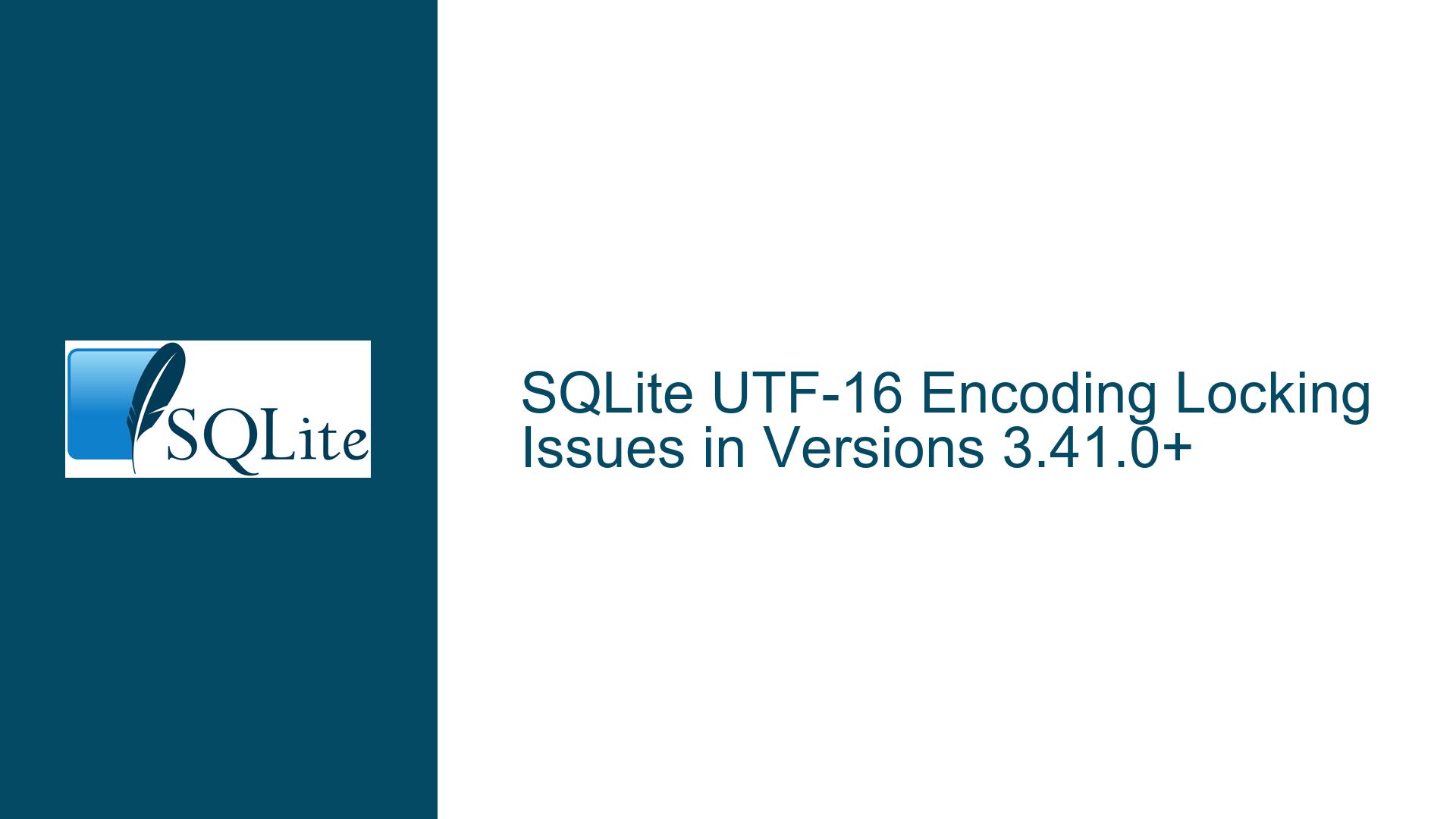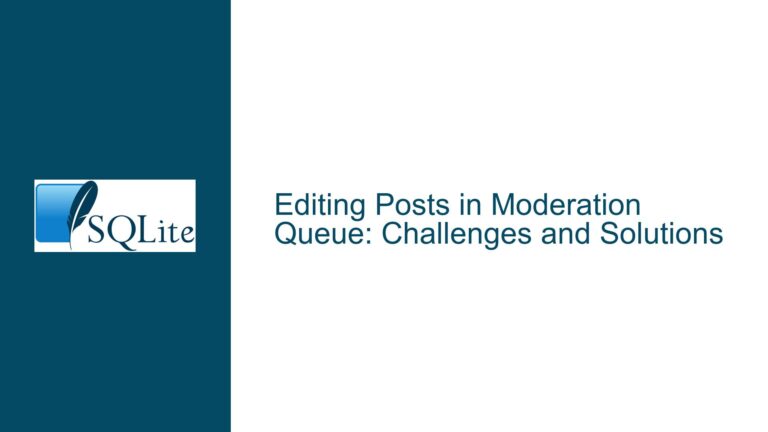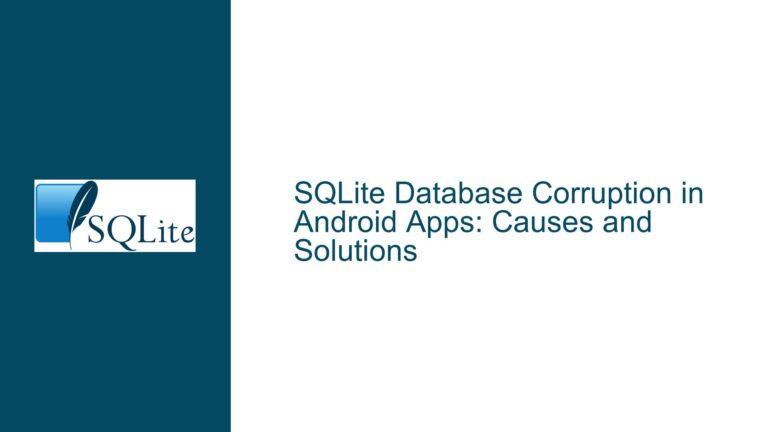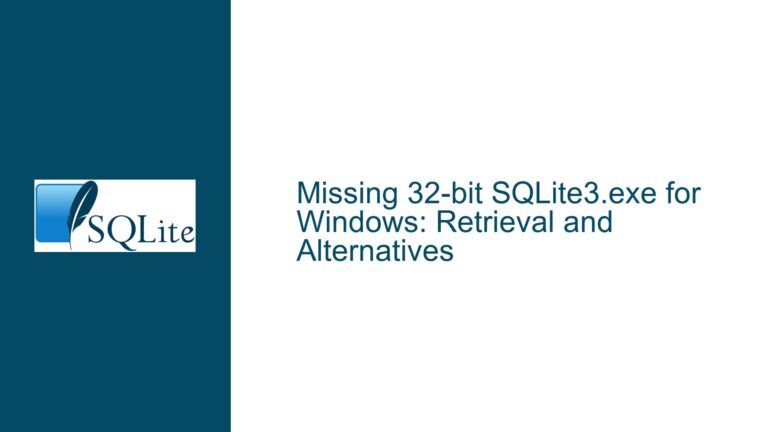SQLite UTF-16 Encoding Locking Issues in Versions 3.41.0+
Database Initialization Conflicts with UTF-16 Encoding in SQLite 3.41.0+
Problem Context: Locked Database During VACUUM or Schema Access
The core issue arises when interacting with SQLite databases encoded in UTF-16 across versions 3.41.0 and newer. Users encounter a "database is locked" error (SQLITE_LOCKED, error code 6) when attempting operations such as VACUUM or schema queries immediately after opening the database. This behavior is inconsistent with UTF-8 encoded databases and does not manifest in SQLite versions prior to 3.41.0. Applications like DB Browser for SQLite exhibit partial functionality failures (e.g., missing table structures) when opening these databases, even after the initial SQLite library fix.
Root Causes: Schema Initialization Race Conditions and Encoding Handlers
Schema Initialization Locking Logic
SQLite initializes a database’s schema during the first connection. For UTF-16 databases, this process involves decoding the schema metadata (e.g.,sqlite_schematable) using 16-bit encoding. In versions 3.41.0+, a race condition occurs when aVACUUMor schema query is executed before the initialization process fully completes. The internal flagDBFLAG_Vacuumis not properly accounted for during UTF-16 schema parsing, leading to premature locking checks that misinterpret the database state.UTF-16 Encoding-Specific Edge Cases
The SQLite engine uses different file-opening routines (sqlite3_open()vs.sqlite3_open16()) based on encoding detection. UTF-16 databases opened viasqlite3_open()(the default for many applications) trigger a deferred encoding check during schema initialization. This deferred check creates a window where subsequent queries conflict with the ongoing schema decoding, especially if those queries attempt to modify the database (e.g.,VACUUM) or access schema metadata before initialization finishes.Third-Party Application Workflows
Tools like DB Browser for SQLite executePRAGMA database_listorPRAGMA function_listimmediately after opening a database. These pragmas initiate schema reads before the initialization process finalizes, exacerbating the lock conflict in UTF-16 databases. Applications that do not explicitly usesqlite3_open16()for UTF-16 files inadvertently bypass encoding-specific initialization safeguards.
Resolution: Mitigating Lock Conflicts in UTF-16 Databases
Step 1: Apply SQLite Patches or Upgrade
The primary fix for the VACUUM locking issue was introduced in SQLite check-in 8b0fe63f87366103, which modifies the schema initialization logic to account for DBFLAG_Vacuum during encoding checks. Ensure your SQLite library is updated to version 3.41.2 or newer, which includes this patch. For compiled applications, rebuild against the patched SQLite source.
Step 2: Modify Application Workflows for UTF-16 Databases
Applications must handle UTF-16 databases differently to avoid lock conflicts:
- Explicit Encoding Detection: Before opening the database, read the first 16 bytes of the file to check for the UTF-16 BOM (
0xFEFFor0xFFFE). Usesqlite3_open16()instead ofsqlite3_open()for these files to ensure proper encoding handling from the start. - Defer Schema Queries: After opening the database, execute a trivial query (e.g.,
SELECT 1;) or wait for thesqlite3_step()of initial pragmas to returnSQLITE_DONEbefore issuingVACUUMor schema-accessing queries. This allows the initialization process to complete fully.
Step 3: Adjusting PRAGMA Execution Order
In applications like DB Browser for SQLite, reorder operations to avoid schema access during initialization:
// Problematic Workflow
sqlite3_open("utf16.db", &db);
sqlite3_prepare_v2(db, "PRAGMA database_list", ...); // Locks schema
sqlite3_prepare_v2(db, "SELECT * FROM sqlite_schema", ...); // Fails
// Corrected Workflow
sqlite3_open16("utf16.db", &db); // Use UTF-16 opener
sqlite3_prepare_v2(db, "SELECT 1", ...); // Allow initialization
sqlite3_finalize(...); // Release resources
// Now execute PRAGMAs or schema queries
Step 4: Rebuild Third-Party Tools with Updated SQLite Libraries
For tools like DB Browser for SQLite, ensure they are linked against SQLite 3.41.2+ and include the encoding-specific open logic. If rebuilding is impractical, apply the following workaround in the application code:
// Detect UTF-16 encoding before opening
FILE* f = fopen("database.db", "rb");
uint16_t bom;
fread(&bom, sizeof(uint16_t), 1, f);
fclose(f);
if (bom == 0xFEFF || bom == 0xFFFE) {
sqlite3_open16("database.db", &db); // Force UTF-16 handling
} else {
sqlite3_open("database.db", &db);
}
Step 5: Monitor Long-Term Fixes in SQLite
Track the SQLite changelog for updates related to UTF-16 initialization. The issue discussed in forum post #8 highlights a lingering bug where PRAGMA function_list interferes with subsequent queries. This was addressed in later commits (e.g., af7173a10ec6), emphasizing the need to stay updated.
Summary of Key Fixes and Precautions
- Encoding-Specific Opening: Always use
sqlite3_open16()for UTF-16 databases to align internal encoding checks. - Schema Initialization Order: Allow initialization to complete by running a no-op query before critical operations.
- Patch Compliance: Verify that all SQLite dependencies in your toolchain include the relevant fixes for
DBFLAG_Vacuumand UTF-16 race conditions. - Application Logic Audits: Review third-party tools for improper pragma/query sequencing and advocate for fixes upstream if needed.
By addressing encoding handling at the file-open stage and ensuring schema initialization completes before demanding operations, developers can resolve the locking issues endemic to UTF-16 databases in modern SQLite versions.






